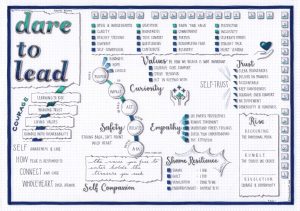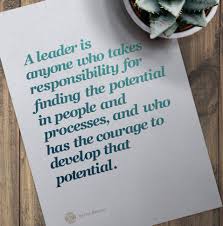 “What skills will be needed in the future?” “What does it mean to be future ready?”
“What skills will be needed in the future?” “What does it mean to be future ready?”
As educators we ask, or are asked these questions often – what is your answer? I think that the body of work that Brene Brown has amassed over her years of researching vulnerability, has the most compelling answer. On page 4, of her latest book “Dare to Lead”, she writes:
We need braver leaders and more courageous cultures
“Dare to Lead” takes a deep dive into what this call to action means: what the NEED is, what BRAVE means, what LEADERS need to be able to do, how to get MORE COURAGEOUS and what this looks like, sounds like and feels like in a CULTURE.
You would be interested in this read if you:
1) Are looking for great leadership skills and strategies
2) Are looking for great language to build a culture of risk taking for yourself and others
3) Need to know what future ready skills look like in the workplace, not just in classrooms and educational organisations
4) Want to improve your leadership stance
I can’t recommend this book more strongly to our educational leaders, because in it Brene Brown centres leaders as agents in building trust, healthy striving, and emotional literacy. She provides skill-builders and self-checks for these and other key characteristics for future ready leaders.
One of my highlights is her strategies for leadership around more everyday tasks that turn these tasks into levers for culture building. If you’ve ever been in a meeting and heard “This is a safe space” without any of the context building (i.e. you can’t just declare a meeting a safe space!), or “With all due respect…” without any of the respect, then you can appreciate Brene Brown’s research and findings:
Because of my core value of courage, I give myself permission to say “I need a break” or “The way you’re acting is keeping me from hearing what you’re saying…we’re going to have to find a different way to do this because I’m just defending myself. For me, this aligns with courage. Ask for time; ask to circle back; ask them to say more.(pg. 205)
As educators, we need this type of language because of the nature of our roles – we are put in situations of high emotional stakes, of future-on-the-line conversations about students with parents, and more.
On page 256, she provides an excellent strategy for meetings called tactical breathing – to be used when one feels the meeting is happening to them not with them. I love this as a strategy for one’s self, but also as a strategy for the whole group to take up.
We don’t take enough deep breaths at work. We don’t pause enough to check our body…[Tactical] breathing is also the key to another strategy for reckoning with emotion, and one of the most underrated leadership superpowers: practicing calm. (pg. 257)
Her work also is grounded in systems changes as well. When it comes to Professional Growth Plans, or Professional Assessments, Brown’s work provides a great lens through which to view, assess and manage organisational growth. Dare to Lead offers great anecdotes from corporations and start ups that have shifted their performance management systems away from high-stakes all-or-nothing towards programs, “…where employees share feedback with their colleagues on a continual basis; where nothing is anonymous, hard conversations are the norm, and this whole process is run by the employee, including how they want to integrate the feedback they receive.” (pg. 207)

“Dare to Lead” is full of great stories and contributions from many different organisations on how they are integrating Brown’s research into their cultures – and the benefits that it is having. But she doesn’t shy away from how hard this work is either.
…acknowledge and reward great questions and instances of “I don’t know, but I’d like to find out” as daring leadership behaviours. The big shift here is from wanting to ‘be right’ to wanting to ‘get it right’. (pg. 92)
If you think that this sounds a lot like ’embracing ambiguity’, you’d be right! This is why I believe that her work belongs in the conversation about educational change – the skills we need to enact it, and the skills we need to integrate into the learning as being part of the learning itself.
In the end, this book is important for answering a lot of questions we, as educators, ask and get asked. It’s first and foremost about developing the self, not about STEM programs. It’s about cultivating meaningful, authentic relationships, not about grades and gaming the college admission system. As Brene Brown writes in closing “Dare to Lead”:
Here is the bottom line: If we don’t have the skills to get back up, we may not risk falling. And if we are brave enough often enough, we are definitely going to fall.
If you’ve listened to Seth Godin’s podcast Akimbo on “Stop Stealing Dreams” and the two that follow it – because they are the questions and answers which are so valuable! – or if you’ve read any of Alfie Kohn’s work, you know that there is a change-a-comin’ for education. Brene Brown’s work needs to be in this conversation that will help us get this change going in a way that is responsible, sustainable and meaningful.

Thanks for this thoughtful synthesis @gnichols, framed with your extensive wisdom and very own powerful outlook. It’s an awesome approach to leadership that parallels the very culture we seek to create for our students. I’m in! And I look forward to comparing notes. I think about this all the time – what the implications may be of inspiring a shift from the judging cultures that can too often characterize schools, to one of mentorship? What happens when all of us fell truly supported – heard! – and in that way empowered. Surely so much more important that implementing a new concept/approach across a community, no matter how visionary. I hope I can find the courage! Peace.
Thanks for this Graham,
I just finished Todd Rose’s latest called “Dark Horse”, and in it he cites two key examples that shine a light on the significance of mentorship: Summit School in NorthEast US, and Southern New Hampshire University – both of these highly successful educational organizations Todd Rose uses as examples of Personalization + Individual Choice. Both of them prioritize the role of mentorship. Looking forward to hearing what you think!
Garth.
I got this book for my birthday and now I can’t wait to crack it open! Thanks for the review @gnichols!
I’d love to know what you think about it. I haven’t stopped considering many of her strategies!
Thanks for the book review @gnichols. Not only do I like how you’ve laid it out (I’m building my idea bank), I think you’ve also brought a good book to the table. I love the fact you brought a book to the conversation that is not specifically about teaching but can be brought into our lives through our work and daily living. Taking time to breathe and to be true to ourselves is huge (and so hard!). I look forward to chatting with you more about this at F2F#3.